13 Great Tips to Improve the Quality of Life for MS Patients

Navigating life with multiple sclerosis (MS) can be like walking through a maze with unexpected twists and turns. But, with the right guidance and tools, anyone can find their way more easily. This article will explore some remarkable ways to help patients with MS and their caregivers live their best lives.
Table of Contents
Understanding Multiple Sclerosis (MS)
Imagine your body’s nervous system like a bunch of electrical wires, which allow your brain to communicate with the rest of your body. Now, these wires are covered with a protective layer, like the plastic on a phone charger. Multiple sclerosis occurs when that protective layer gets damaged.
Why does this damage occur in the first place? In MS, the body’s defense system gets confused and starts attacking this protective covering. This nervous system damage makes it harder for the brain to send messages to the rest of the body.
The 4 Types of Multiple Sclerosis
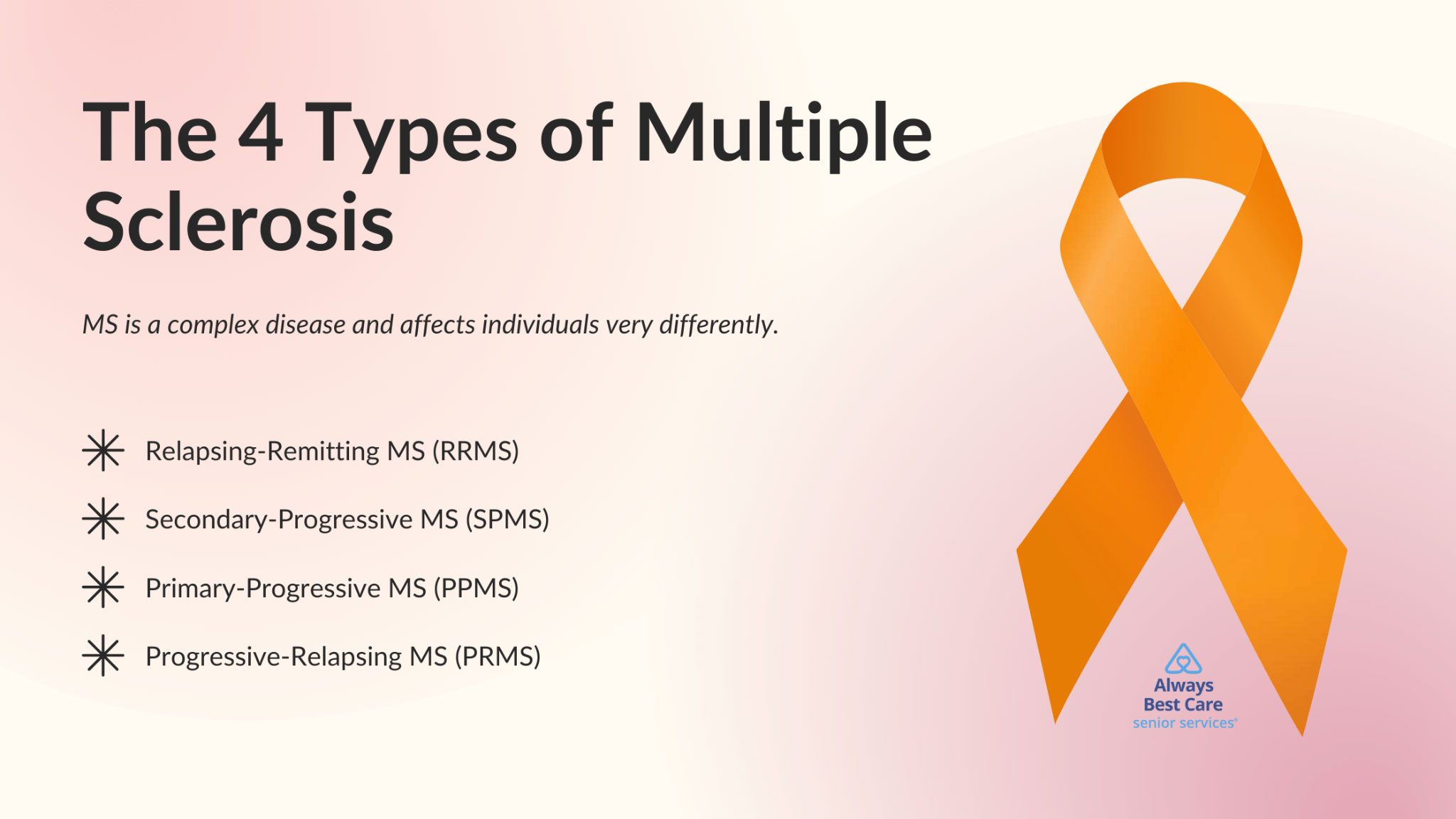
- Relapsing-Remitting MS (RRMS): This is the most common MS type. Patients with RRMS experience episodes when their symptoms get worse, called relapses.
- Secondary-Progressive MS (SPMS): People who first have RRMS might develop Secondary-Progressive Multiple Sclerosis. That means their symptoms steadily worsen over time without many breaks.
- Primary-Progressive MS (PPMS): This MS type is rare. Symptoms worsen little by little from the beginning, without any breaks.
- Progressive-Relapsing MS (PRMS): This is a rare MS type. Patients with PRMS exhibit steadily worsening symptoms, as well as relapses now and then.
Even though this disease sounds scary, many people with MS live active, happy lives. Various medicines and therapies help manage the symptoms, and scientists are working daily to learn more about MS and how to treat it!
How to Help MS Patients
1. Make Your Loved One a Part of the Healing Process
Anyone battling multiple sclerosis needs all the help they can get. And guess who’s the main player in this fight?
The patient!
Like in a team game, if one of the players sits out, the whole team’s performance drops. Here’s why it’s essential to include MS patients in their recovery:
- Understanding Their Body: Each MS patient feels different. Doctors and therapists can customize treatments that fit just right by listening to the patient’s insights.
- Setting Goals: It’s like having a personal map for recovery. Patients can share their dreams, like dancing at a friend’s party or taking a nature walk to stay motivated on their recovery journey.
- Learning About MS: Knowledge is power! Understanding MS and its types empowers our loved ones to tackle it better.
- Feedback: It’s like giving a report card on how things are going. Patients can tell their doctors if something’s not working, prompting them to adjust the plan.
Now, think about the opposite. If we leave patients out of the loop, they might feel lost or scared. That’s not a helpful place for recovery. Plus, doctors and therapists might miss out on essential details only the patient knows.
2. Keep the Brain Constantly Active
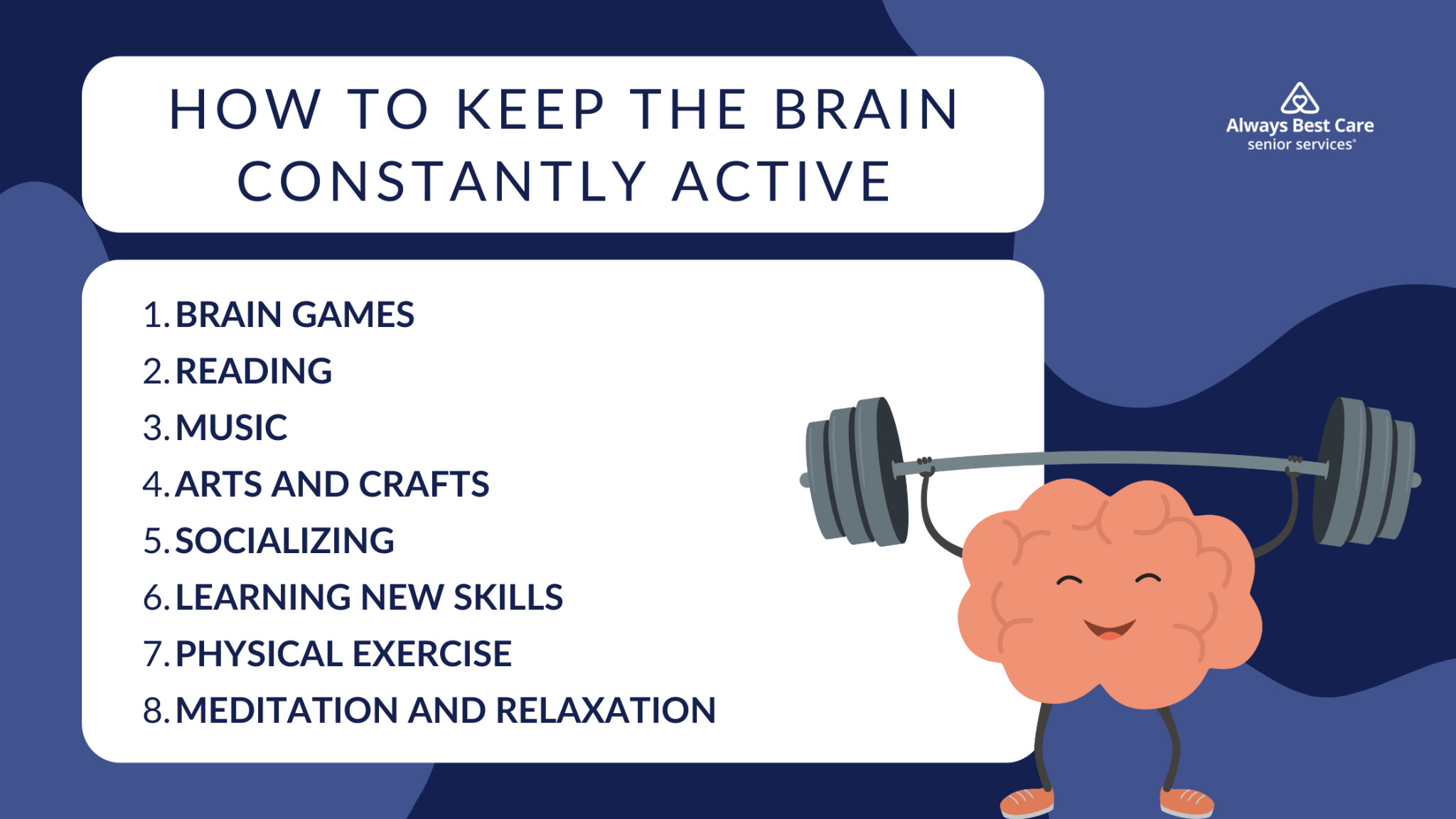
Think of your brain as a state-of-the-art computer. Even with glitches, keeping it busy will improve its performance. So, just like doing sit-ups for our belly, there are brain “workouts” forpeople with MS:
- Brain Games: Puzzles, memory games, or even strategy games are push-ups for the brain. They sharpen thinking and improve memory.
- Reading: It’s like taking the brain on an adventure! Whether it’s comics, novels, or magazines, reading fires up different parts of the brain and keeps it curious.
- Music: Learning an instrument or listening to different tunes sparks brain activity. For those who love to move, dancing can be a double win – it’s good for the brain and the body!
- Arts and Crafts: Painting, drawing, or doing crafts is not just fun; it’s a workout for the brain that boosts creativity and improves hand-eye coordination.
- Socializing: Chatting with friends or joining a club can keep the brain buzzing. Talking and laughing with others is not just good for the soul; it’s also a top-notch brain booster.
- Learning New Skills: This can be anything, like cooking a new recipe, trying a new hobby, or even learning a new language! Every time we learn something, we add a new app to our brain-computer.
- Physical Exercise: Moving the body helps the brain, too. Simple exercises, walks in the park, or even yoga increases blood flow to the brain, giving it more energy and power.
- Meditation and Relaxation: It might sound like doing nothing, but meditation is like a spa day for the brain, allowing it to relax, refresh, and refocus.
3. Curb Harmful Addictions
Just like a car needs the right fuel to run smoothly, our bodies need the right stuff to function appropriately. Now, for people with MS, it’s even more crucial to make sure they’re putting the best “fuel” into their bodies.
- Smoking: Cigarettes are like pouring sand into a car’s gas tank. Not a good idea, right? For MS patients, smoking can worsen their symptoms, aiding in the faster progress of the disease. Cigarettes have chemicals that harm the protective covering of our nerves. Kicking the smoking addiction can be challenging, but it’s one of the healthiest moves for anyone with MS. Plus, there are many resources to help people quit, from apps to books and support groups.
-
Alcohol: For people with MS, heavy drinking messes with their balance and makes them feel fatigued. Furthermore, it may even mix badly with their medications. It’s always recommended to chat with a doctor about how much (if any) alcohol is acceptable for your loved one.
Here’s the cool part: saying “no, thanks” to these harmful habits and addictions may have a HUGE impact on people with MS. It can help them feel better, have more energy, and even slow down the effects of their disease. It’s all about giving their bodies the best chance to fight against MS and live their best life!
4. A Healthy Diet Helps Both You and Your Loved One

First up, let’s talk about vitamin D. This isn’t just any vitamin; it’s like a special helper for people with MS! There’s quite a bit of chatter among the scientific community about how vitamin D helps manage the symptoms of MS. (Sintzel et al.)
So, where can we get this fantastic vitamin? A bit of sun is one way (remember sunscreen!). But you can also find it in foods like milk, fish, and eggs. And if that’s not enough, sometimes doctors recommend a vitamin D supplement to ensure you get all you need.
Now, onto 4 ways to improve the diet for people with MS:
- Fruits & Veggies: These aren’t just snacks, but power foods! Spinach, berries, and oranges all have vitamins that help keep the body strong.
- Whole Grains: Whole grain bread, brown rice, and oatmeal are great choices. They’re packed with energy and are super healthy for you.
- Proteins are Important: Think chicken, fish, tofu, and beans. They help keep muscles strong and give the body the energy it needs.
- Cut Back on the Not-So-Great Stuff: Eat less salty, sugary, and super fatty foods. They might taste good for a moment but don’t help in the long run.
And hey, for the home caregivers out there, these tips are for you too! By following a healthy diet, not only are you helping your loved one with MS, but you’re also taking care of yourself.
5. Add Regular Exercise to Their Routine
Exercise is more than just looking cool in gym clothes or lifting weights. For people with MS, moving and grooving can help big time, boosting energy, helping with balance, and making muscles stronger. Plus, it’s a great way to feel happier and more relaxed!
Everyone’s different, so the best exercise varies from person to person. Here are some fantastic routines to consider:
- Walking: Simple, right? But oh-so-effective. Walking around the block or in a local park improves heart health and builds stamina.
- Yoga: You don’t have to twist yourself like a pretzel! Basic yoga moves improve flexibility and reduce muscle stiffness.
- Swimming: The water’s a magical place for people with MS. It’s easy on the joints and provides resistance to help strengthen muscles.
- Stretching: It helps with flexibility and reduces muscle tightness.
- Stationary Biking: You don’t have to finish the Tour de France! A stationary bike at home or the gym is a terrific way to get the heart pumping.
- Strength Training: We’re not talking heavyweights here. Even light weights or resistance bands help build muscle strength.
6. Address Sleep Issues
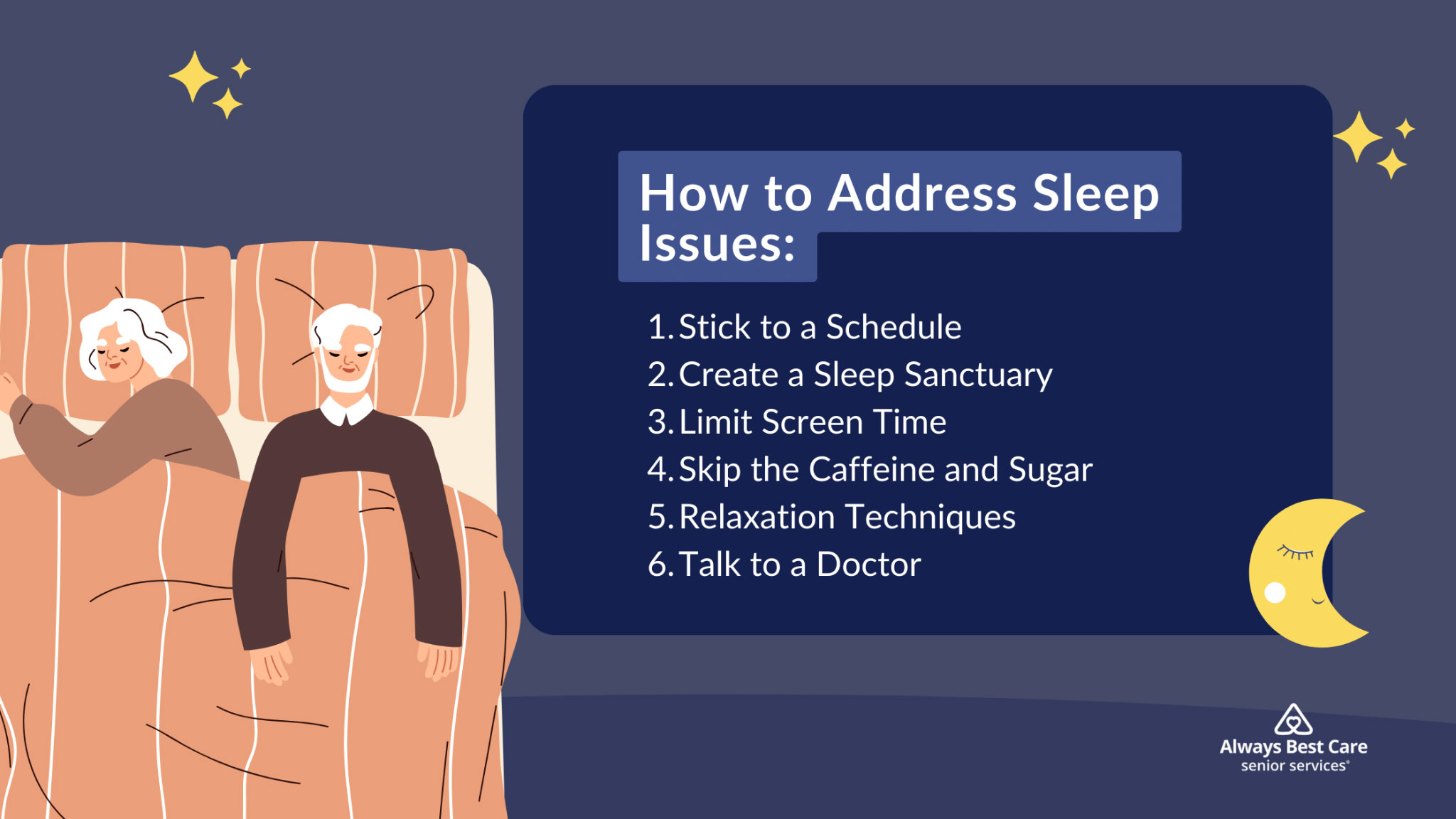
multiple sclerosis, enjoying a restful night of sleep makes a huge difference in feeling better. But sometimes, rest can be elusive to them. Let’s explore some tried-and-true ways to help your loved one with MS catch those precious Z’s more easily:
- Stick to a Schedule: It’s all about the routine. Going to bed and waking up at the same time every day, even on weekends, helps set the body’s “internal clock.” After a while, the body will know when it’s bedtime.
- Create a Sleep Sanctuary: The bedroom should be a chill zone. That means comfy pillows, dark curtains, and some soothing sounds.
- Limit Screen Time: The light from TVs and electronic devices can mess with the brain’s sleep signals. Aim to put devices away an hour before hitting the hay.
- Skip the Caffeine and Sugar: Late afternoon coffee or that sneaky midnight snack? They might be keeping you awake. Best to have them earlier in the day.
- Relaxation Techniques: Deep breathing, meditation, and calming music will help the body wind down. It’s like giving the brain a gentle nudge saying, “Hey, it’s time to relax now.”
- Talk to a Doctor: Sometimes, despite trying everything, sleep can still be a puzzle. If that’s the case, it’s time to contact a doctor. They might have more ideas or check if there’s something else going on.
7. Create a Patient-Friendly Environment
Like everyone else, MS patients want to move around without a hitch. But sometimes, their condition can make things challenging. Fortunately, with a few changes, we can make their environment more comfortable and easy to navigate!
- Slip-Proof Flooring: Slipping is a genuine concern. Swapping out slippery rugs with anti-slip mats or adding grip tapes to slippery areas is a game-changer.
- Grab Bars: They’re like extra hands on the walls! Installing them in the bathroom or near steps helps MS patients move around more confidently.
- Clutter-Free Zones: Keeping walking paths clear of toys, shoes, and other random things means there’s less chance of tripping. A tidy space is a safe space!
- Good Lighting: Bright lights can make all the difference, especially in hallways or stairs. Being able to see clearly helps prevent unnecessary accidents.
- Lower Shelves: For those days when reaching up feels like a mission, having things on lower shelves is super helpful.
- Chairs With Arms: Having armrests to push off from will make standing up easier.
- Wider Doorways: If someone’s using a wheelchair or walker, wider doorways will help them glide through without getting stuck.
- Easy-to-Use Handles: Twisty doorknobs can be tricky. Lever handles or push buttons? Now we’re talking!
8. Avoid Heat Exposure
Heat exposure exacerbates MS symptoms. It’s like when you’re trying to use your phone on a sunny day — it gets overheated and slows down. Similarly, the heat can make the body’s signals go haywire for someone with MS.
Avoiding the heat doesn’t mean packing your bags for Antarctica! It’s more about being innovative when it comes to staying cool. Think of a day at the beach. Instead of baking under the sun, find a shady spot or wear a wide-brim hat. Drinking lots of water also helps keep the body’s inner “thermostat” just right.
Air conditioning can be a real lifesaver during the hotter months. And if someone with MS plans to be outdoors, picking the cooler parts of the day, like early morning or late evening, can make a big difference.
Remember those nifty cooling towels and wristbands? They aren’t just for athletes but for patients with MS, too, especially when they’re on the go!
9. Overcome Symptoms of Depression
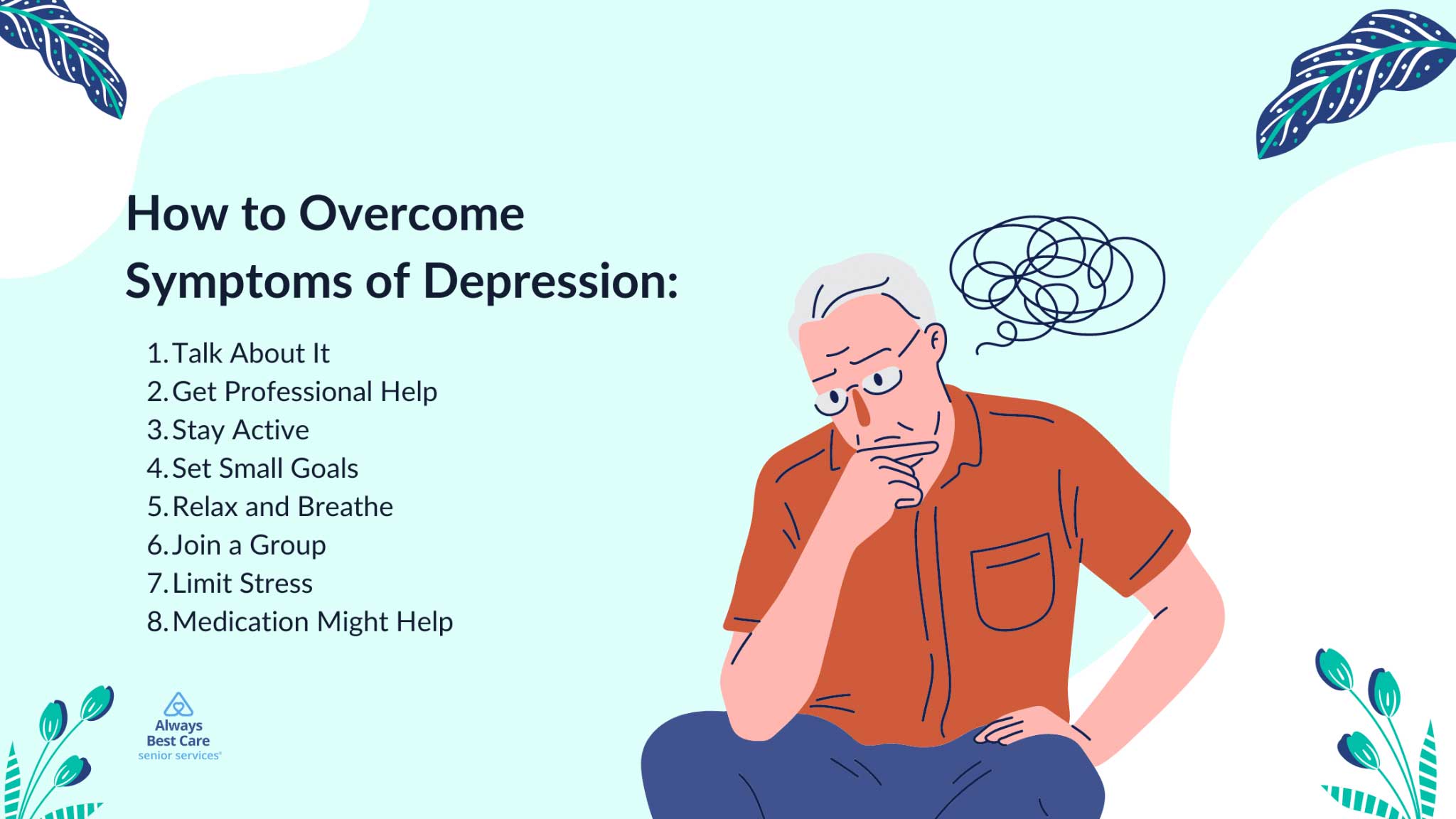
Many people with multiple sclerosis (MS) are struck by sadness or depression occasionally, and that’s okay. Embrace these feelings, then learn how to gradually overcome them. Let’s dive into some ways to help our loved ones with MS chase away those blues:
- Talk About It: Feeling down? Could you talk to someone you trust? Whether it’s a friend, family member, or doctor, opening up will help big time. Sharing how you feel is like letting out steam from a teapot!
- Get Professional Help: Sometimes, you need more than just a chat. Therapists and counselors are your emotional coaches, helping to figure out those confusing feelings and find ways to improve your mood.
- Stay Active: Even a short walk or stretching can help. Moving your body releases happy chemicals in your brain.
- Set Small Goals: Every little thing you achieve is a win! It could be reading a book chapter or making a yummy snack. Celebrate every victory, big or small.
- Relax and Breathe: Try simple relaxation exercises. Closing your eyes, taking deep breaths, and imagining a happy place will help reset your mood.
- Join a Group: Sharing your feelings and hearing from partners in your MS journey will only strengthen your resolve.
- Limit Stress: Easier said than done! Try to set some time for yourself every day, even if it’s just 5 minutes of listening to your favorite song.
- Medication Might Help: Chat with your doctor to learn more about the right antidepressant medicines for you.
10. Managing Stress Levels
For people with multiple sclerosis (MS), too much stress can make their symptoms act up. Let’s explore some cool ways to help our friends with MS keep those stress levels in check:
- Time Out: Taking breaks can be a game-changer, whether it’s a short walk, listening to music, or just taking a moment to breathe.
- Learn to Say “No”: It’s totally acceptable to put yourself first sometimes.
- Stay Connected: Talking to friends or family can be a huge stress buster.
- Get Moving: Exercise is a stress ninja! It doesn’t have to be a big workout; even some gentle yoga or a leisurely walk will help.
- Keep a Journal: Writing down thoughts or worries is akin to emptying a backpack that’s gotten too heavy. It’s a neat way to sort through feelings.
- Deep Breathing: Taking deep breaths is a quick way to feel calmer.
- Stay Organized: A plan or to-do list can help make things less chaotic. Knowing what’s coming up can make it easier to handle.
- Try Relaxation Techniques: Meditation or listening to calming sounds can work wonders. Even if it’s just for a few minutes, give it a shot!
- Limit Caffeine: That extra soda or cup of coffee might seem tempting, but too much caffeine can increase stress. Try some herbal tea instead.
- Seek Help if Needed: Contact a counselor or therapist if stress overwhelms you. They’ve got some excellent tools and tips to help out.
11. Indulging in Fun Activities
For someone with MS, some days are more challenging than others. And we all have days where we need a little fun to shake things up. Fun activities can feel like a bit of sunshine breaking through the clouds!Painting, for example, is a great way to express feelings. Plus, focusing on creating something beautiful can take their mind off any discomfort or worries. It’s like giving the brain a mini-vacation. And the cool thing is, they don’t have to be Picasso; it’s all about enjoying the process.
Dancing is another terrific way to lift spirits. Even if it’s just swaying to a slow tune, moving to the rhythm can make a big difference. It’s not only good exercise, but it also releases those feel-good vibes.
And let’s not forget about board games or video games. They can be an exciting way to challenge the brain and spend time with friends or family. Imagine a fun game night with laughter, a bit of friendly competition, and some delicious snacks. Doesn’t that sound like a blast?
12. Setting Up Auto-Refills for Prescription Medications
Imagine having a favorite TV show, and instead of remembering when the next episode airs, it just magically appears for you to watch. That’s what auto-refills are like for medications. No need to mark calendars or set alarms — the pharmacy has got it covered!
Multiple sclerosis can sometimes be unpredictable. One day might be smooth sailing, and the next might be more demanding. On those challenging days, the last thing someone with MS wants to worry about is running out of meds.
Having medications on auto-refill is one less thing to stress about! Plus, it’s not just about convenience. Consistency is key with many MS medications. Skipping or not taking doses at the right time can mess with their effectiveness. It’s easier to stick to the doctor’s instructions by always having them on hand.
Some people worry about the cost, but many pharmacies offer discounts or deals for those who set up auto-refills. And with some medicines being delivered straight to the door, it’s like having a personal medication assistant!
13. Reach Out to Support Groups
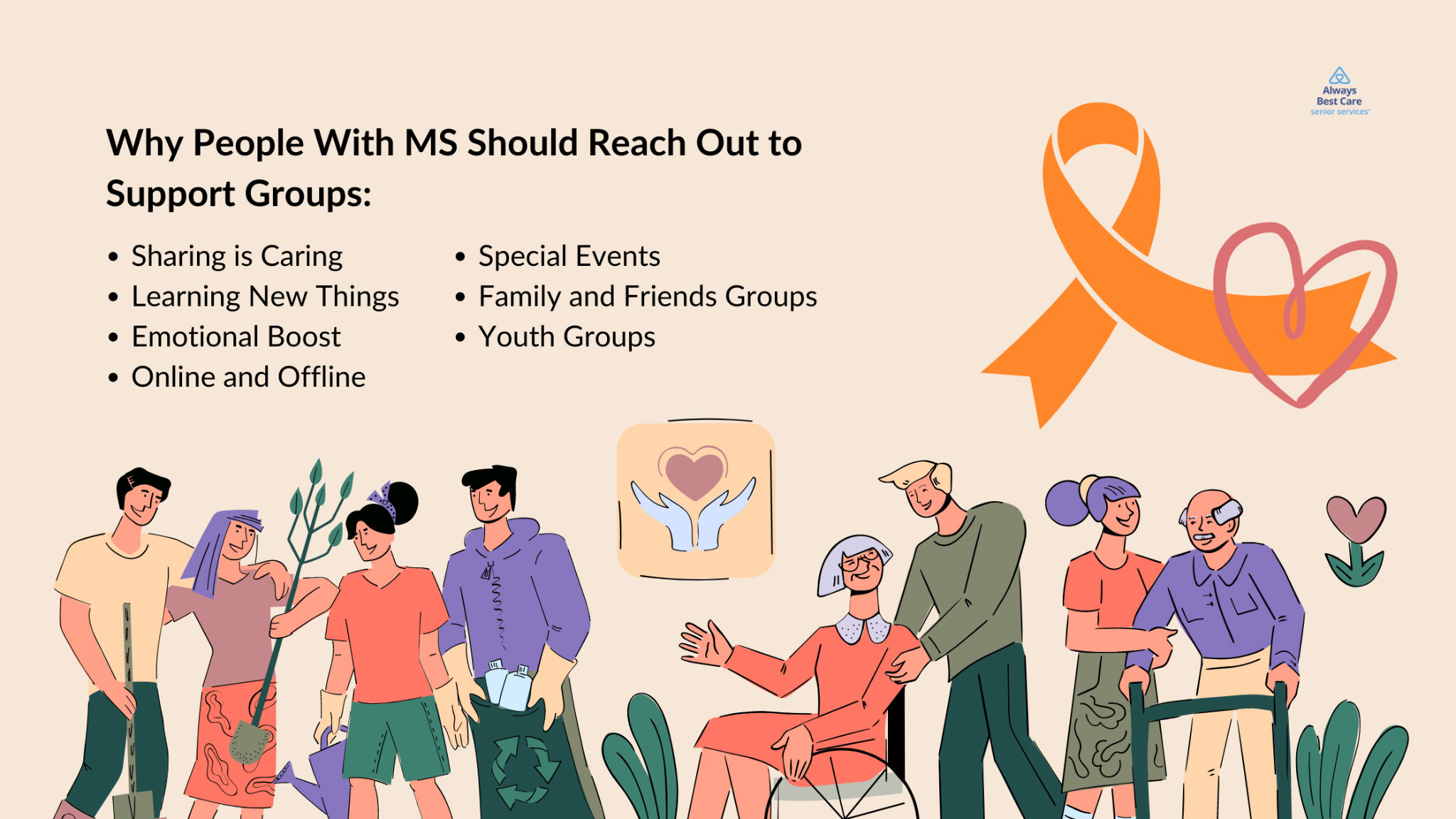
One of the most remarkable ways to help someone with multiple sclerosis (MS) is by linking them with support groups! People with MS experience a palpable improvement in theirsymptoms when they meet others who understand what they’re going through.
- Sharing is Caring: Support groups are about people coming together and sharing their stories. It’s a safe space where everyone “gets it.” You can share tips, experiences, and a few laughs!
- Learning New Things: These groups often bring experts who share the latest information about MS treatments, exercises, and other treatment avenues.
- Emotional Boost: Multiple sclerosis leads to isolation, so being in a group where everyone has your back can be a solid mood booster.
- Online and Offline: Websites like the National MS Society have lists of local groups, while places like MS World offer online chat rooms.
- Special Events: Some groups host events or activities, such as yoga classes or picnics. It’s a fun way to meet, hang out, and do something cool together.
- Family and Friends Groups: It’s not just for those with MS! There are also groups for family and friends because they might need support and understanding.
- Youth Groups: Special groups are tailored for younger people with MS or kids whose parents have MS. It’s all about connecting with people your age who get what you’re going through.
Always Best Care Provides Unmatched Services for People With Multiple Sclerosis!
Always Best Care provides quality senior services tailored to your specific needs and abilities. Contact us today at (760) 848-0427 to schedule a free consultation and learn more about how we can assist you in safely and comfortably aging in place!
References
- “5 Tips for Living Better with MS: Patients and Caregivers.” JHM, 9 Feb. 2023, www.hopkinsmedicine.org/health/conditions-and-diseases/multiple-sclerosis-ms/5-tips-for-living-better-with-ms-patients-and-caregivers. – Accessed 18 Aug. 2023.
- “7 Tips to Improve Quality of Life for Ms Patients.” 24 Hour Home Care, 20 July 2023, www.24hrcares.com/resource-center/tips-to-improve-quality-of-life-for-ms-patients. – Accessed 18 Aug. 2023.
- Jones, Heather. “Tips for Building Confidence and Living with Ms.” Verywell Health, Verywell Health, 27 June 2022, www.verywellhealth.com/improving-life-with-ms-5224656. – Accessed 18 Aug. 2023.
- Rodriguez, Diana, et al. “11 Lifestyle Tips to Help You Manage MS Symptoms.” EverydayHealth.Com, www.everydayhealth.com/multiple-sclerosis/lifestyle-tips-help-you-manage-ms-symptoms. – Accessed 18 Aug. 2023.
- Sintzel, Martina B, et al. “Vitamin D and Multiple Sclerosis: A Comprehensive Review.” Neurology and Therapy, US National Library of Medicine, June 2018, www.ncbi.nlm.nih.gov/pmc/articles/PMC5990512/. – Accessed 18 Aug. 2023.





